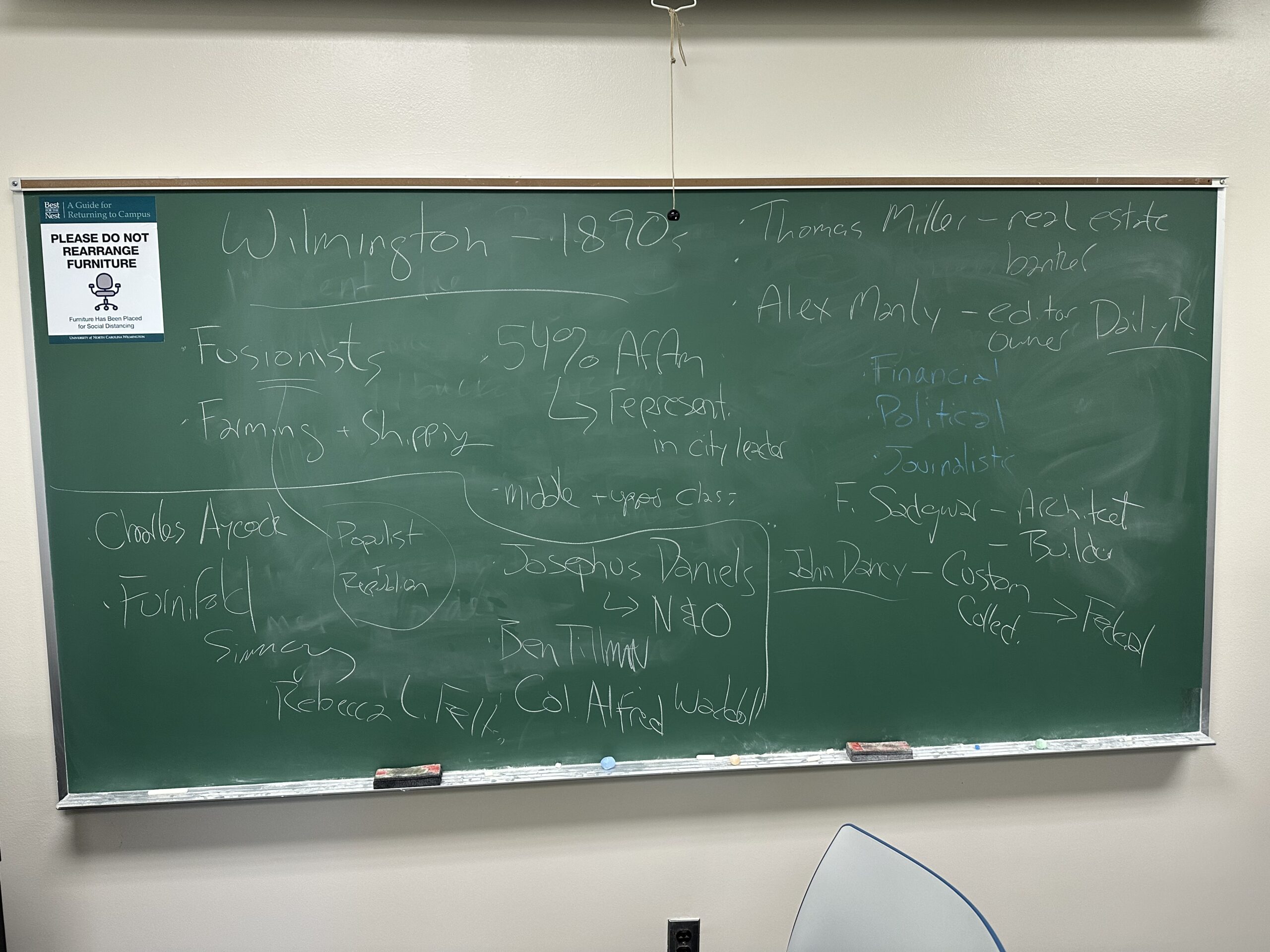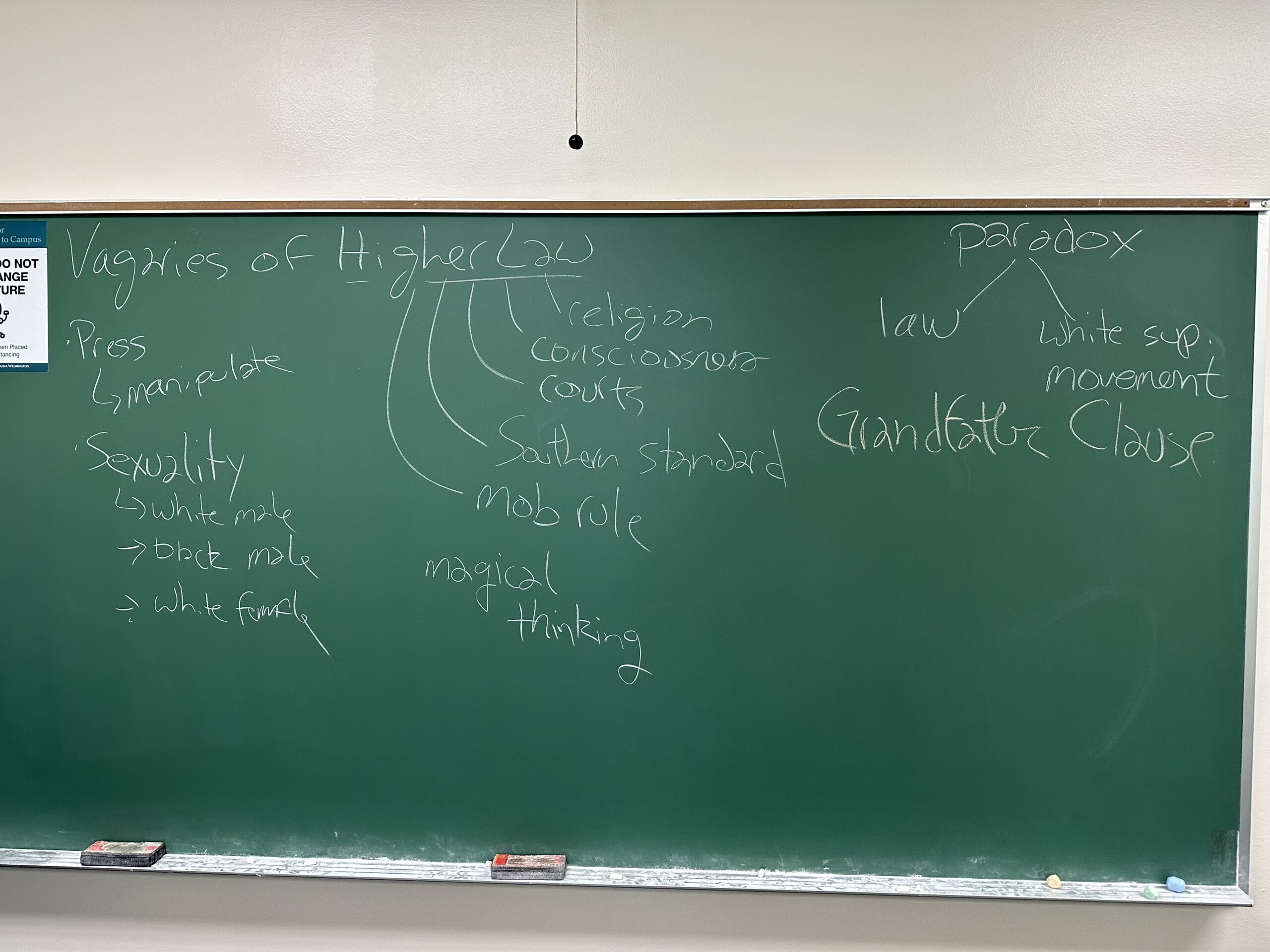Wilmington Daily Record
The final third of this blended course is actually a years-long project: recovering the history and stories of Black Wilmington before the 1898 massacre. This unit merges the approaches of both the fiction and nonfiction units in that it is focused on storytelling, but those stories are of real residents, businesses, schools, and places of worship. Students have the unique opportunity to research and recover history through the primary study of the seven surviving copies of the Wilmington Daily Record, the only Black daily newspaper in the US after Reconstruction. This newspaper was central to Wilmington’s Black community formation, protest, and advocacy, and as such it was also the target of white supremacist disinformation campaign, terrorist threats, and, ultimately, destruction during the massacre and coup.
Students research the digitized versions of these papers, which have been recovered by the local nonprofit The Third Person Project. During this unit, students research and produce annotations of notable people, places, and events in Wilmington as documented by the newspaper.

These annotations will be part of the book If You Should Know Us As We Are by John Jeremiah Sullivan and Joel Finsel. All students will be credited as Special Researchers in the book, which is devoted to the history of The Daily Record newspaper and the people, places, and events captured within its pages. In an email to me, John Jeremiah Sullivan, who is a two-time National Magazine Award winner and regular contributor to the New York Times Magazine as well as the southern editor of The Paris Review, said of this undergraduate project:
“This is primary documentary work that directly intervenes in the cultural conversation. They need to understand how rare that is. There are scholars who spend their whole careers and never have that experience.”
—John Jeremiah Sullivan
Students utilize a wide variety of resources to help recover these stories. They first begin by reading a transcription of a newspaper issue (alongside its digitized original to understand its context). They are encouraged to pick topics that pique their curiosity, rather than stories that seem historically significant. It’s important to note that this research isn’t about the 1898 massacre; rather, it’s meant to help recover the history of Black Wilmington before the massacre.
Once they have their topics selected, they begin their archival research. The two most primary databases that the students use are newspapers.com and its parent website ancestry.com. Although these are commercial sites, the amount of information they contain is vast. Finsel has also compiled a vast list of other resources that students can use to search, cross-reference, and verify information. They include:

Free Research Databases
Databases Available via UNCW Randall Library
- National Archives
- Freedom of Information Act (FOIA) Reference Guide
- Archive.org
- FamilySearch.org
- Theancestorhunt.com
- UNC Chapel Hill Wilson Library “Southern Folklife Collection” or “North Carolina Collection”
- Doc South
- Library of Congress
- Library of Congress “Chronicling America”
- Google Books
- The NC Digital Heritage Center
- Hathitrust.org
- New York Times Digital Archive
- Worldcat.org
- Oxford English Dictionary
- AccesssibleArchives.com
- Gallica
- Getty Research Center
- Readex
- Heritage Quest
- America’s Historical Newspapers
Databases Needing Subscriptions
Local of Local Historical Societies
- Lower Cape Fear Historical Society, Latimer House
- North Carolina Room, New Hanover County Library (downtown)
- Center for Southeast North Carolina Archives and History, Randall Library, UNCW
AI-Powered Tools to Transcribe and Read Old Documents
- ABBYY FlexiCapture: A document capture and data extraction solution that can automatically recognize text and images in old, handwritten documents.
- Google Drive: Google Drive has an optical character recognition (OCR) feature that can transcribe the text in an image or scanned document and make it editable.
- Adobe Acrobat: Adobe Acrobat Pro DC has an OCR feature that can recognize text in scanned documents and convert it into editable text.
- Readiris: A document scanning and OCR software that can accurately recognize text in old documents and convert it into editable text.
- Transkribus: A free and open-source OCR software that can transcribe and recognize text in historical handwritten documents.
The promise of this last unit also contains its peril. As any researcher knows, searching archives for information that may not be present is both thrilling and frustrating. Students may have a name or an address or an advertisement from the paper but then not be able to find anything of consequence using more than a dozen different archives. Along with UNCW research librarians, Sullivan and Finsel visit the class each semester to give students a tutorial in how to approach this work. Sullivan tells students that exploring these archives and databases is “a lot like playing a musical instrument.” In this metaphor, he explains how there are notes and chords, but you must experiment, through trial and error, with various combinations to make music. Similarly, I tell the students,
The keys to doing primary research are patience, persistence, curiosity, and creativity.
—Professor Josh Roiland